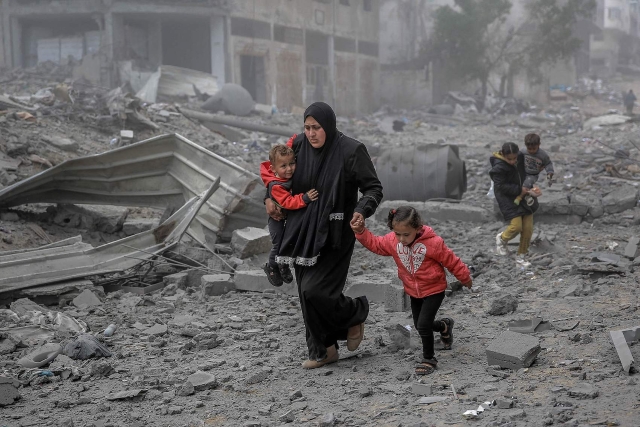
Palestinians flee the area after Israeli bombardment in central Gaza City on March 18, 2024. (Photo: CFP)
The United States recently vetoed a United Nations Security Council resolution calling for an immediate, unconditional, and permanent ceasefire in Gaza. This marks the fourth instance in which the U.S. has single-handedly blocked ceasefire-related proposals on the Palestinian-Israeli conflicts within the Council.
The Palestinian representative responded passionately, declaring, "We are humans! The world should not grow accustomed to the death of Palestinians." On the same day, Israeli airstrikes in northern and central Gaza claimed at least 87 lives within 24 hours, pushing the death toll from the ongoing conflict past 44,000.
In Washington, U.S. lawmakers rejected resolutions seeking to block the sale of tanks and high-explosive mortar rounds to Israel, with votes of 18-79 and 19-78, respectively. Meanwhile, China's UN representative, Fu Cong, expressed dismay over the veto, stating, "The exclusive use of veto power by the United States has destroyed the last hope for the people of Gaza."
Humanitarian crisis deepens amid escalating conflict
The humanitarian toll of the conflict has reached alarming levels. According to Israeli lawmaker Emmanouil Oda, who criticized Israeli Prime Minister Benjamin Netanyahu in a November 18 Knesset session, "There are 17,385 babies in Gaza who have been killed by your system. Of those, 825 were under the age of one." Oda labeled Netanyahu "the serial killer of peace."
On December 4, Amnesty International released a statement asserting that there is sufficient evidence to accuse Israel of committing "genocide" in Gaza. The organization's report, which verified casualty figures from the first six months of the conflict, revealed that nearly 70 percent of the victims were women and children.
Two days later, on December 6, the Israeli military launched another strike on a hospital in northern Gaza, killing dozens, including four doctors. This attack further exacerbated the already dire humanitarian situation in the region.
Compounding the crisis, the Aid Worker Security Database reported a record number of aid worker fatalities in 2024. In the occupied Palestinian territories, including Gaza, 178 aid workers have been killed in 2024 alone.
International law has come under scrutiny, with AFP reporting that Israel used white phosphorus shells in Lebanon, a weapon banned under international law for its indiscriminate and severe impact.
U.S. veto draws global condemnation
The resolution vetoed on November 21, drafted by elected non-permanent members of the UN Security Council, came after five weeks of negotiations. The representative of Guyana expressed disappointment, stating, "Our collective efforts to end the hostilities will not stop. We remain deeply committed to finding unity on this critical matter."
UN Secretary-General António Guterres criticized the Security Council for devolving into "a platform for the powerful to shield their allies." Calls to abolish the veto power have intensified, but U.S. representatives dismissed these demands as "unrealistic," while reiterating their commitment to peace.
China's Fu Cong noted that repeated U.S. vetoes have eroded the Security Council's authority and undermined international law. "The constant supply of weapons has created this disaster, leaving people angry and incredulous," he stated.
In the United States, bipartisan support in Congress for military aid to Israel remains robust. Under the 2016 U.S.-Israel Memorandum of Understanding, 38 billion USD in military assistance was allocated over 10 years, including 33 billion USD for equipment and 5 billion USD for missile defense.
Critics argue that these weapons have significantly contributed to civilian casualties in Gaza, where women, children, and the elderly account for 60 percent of the deaths, according to a fact sheet from Senator Bernie Sanders' office.
Despite the grim outlook, a notable development occurred on November 21: the International Criminal Court issued arrest warrants for Netanyahu and former Israeli Defense Minister Yoav Gallant, citing war crimes and crimes against humanity during a 13-month conflict in Gaza.
This is "a rare moment of validation for Palestinians," said Palestinian-American journalist Laila El-Haddad.
Co-presented by GDToday and the School of Journalism and Communication, Jinan University
Reporter | Liu Xiaodi, Peng Shengjie (intern)
Editor | Yuan Zixiang, Liu Lingzhi, Feng Huiting, James, Shen He
















